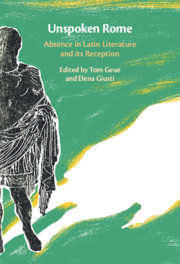Book contents
- Unspoken Rome
- Unspoken Rome
- Copyright page
- Contents
- Figures
- Unspoken Rome: Acknowledgements
- Contributors
- Introduction
- Part I Absence in Text
- Part II Absence in Context
- Chapter 7 Speaking Silence in Cicero’s Brutus and Tacitus’ Dialogus de Oratoribus
- Chapter 8 Et sine auctore notissimi uersus
- Chapter 9 Looking for the Emperor in Seneca’s Letters
- Chapter 10 Marcus Aurelius: Medi()ations Not Medi(c)ations
- Chapter 11 Lost in Germania
- Chapter 12 Conspicuous Absence
- Part III Going Beyond
- Afterword Lights Out
- Bibliography
- General Index
- Index Locorum
Chapter 7 - Speaking Silence in Cicero’s Brutus and Tacitus’ Dialogus de Oratoribus
from Part II - Absence in Context
Published online by Cambridge University Press: 03 September 2021
- Unspoken Rome
- Unspoken Rome
- Copyright page
- Contents
- Figures
- Unspoken Rome: Acknowledgements
- Contributors
- Introduction
- Part I Absence in Text
- Part II Absence in Context
- Chapter 7 Speaking Silence in Cicero’s Brutus and Tacitus’ Dialogus de Oratoribus
- Chapter 8 Et sine auctore notissimi uersus
- Chapter 9 Looking for the Emperor in Seneca’s Letters
- Chapter 10 Marcus Aurelius: Medi()ations Not Medi(c)ations
- Chapter 11 Lost in Germania
- Chapter 12 Conspicuous Absence
- Part III Going Beyond
- Afterword Lights Out
- Bibliography
- General Index
- Index Locorum
Summary
Cicero’s Brutus and Tacitus’ Dialogus de Oratoribus deal with the silence of eloquence resulting from the change of the political system in the first century BC. This silence leads to a paradoxical effect: it produces all the more eloquent speech, which helps to keep the discourse of the position of eloquence going.
In the Brutus, the narrative is driven by the interlocutors’ desire for eloquent speech while the silence of speech is compensated for by the history of Roman eloquence. The conversation is set in a field of tension between two poles of omnipresent silence: the reason for the political change, Caesar, and the climax of rhetorical history, Cicero himself. The former is explicitly omitted, the latter continually postponed until the climax of eloquence is finally released at the end of the dialogue.
The Dialogus deals in hindsight with the absence of great eloquence. While speech and voices are represented in abundance, small but numerous gaps occur within them, creating a gauze of silence that, unobtrusively, keeps the meaning of the text unstable. The conversation is driven on not by the interlocutors’ desire for eloquent speech but by the speech act of promise, which is renewed throughout the text.
- Type
- Chapter
- Information
- Unspoken RomeAbsence in Latin Literature and its Reception, pp. 125 - 141Publisher: Cambridge University PressPrint publication year: 2021

